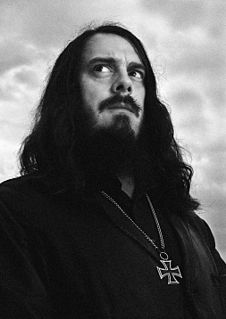A Quote by Andrea Dworkin
Feminist art... will take the great human themes – love, death, heroism, suffering, history itself – and render them fully human.
Related Quotes
Feminist art is not some tiny creek running off the great river of real art. It is not some crack in an otherwise flawless stone. It is, quite spectacularly I think, art which is not based on the subjugation of one half of the species. It is art which will take the great human themes -love, death, heroism, suffering, history itself -and render them fully human. It may also, though perhaps our imaginations are so mutilated now that we are incapable even of the ambition, introduce a new theme, one as great and as rich as those others -should we call it joy?
The reason why you do history, and particularly why you do war, is that you want to make sure that in the next war, some lessons were learned. There's a saying: "History doesn't repeat itself, but it does rhyme." Or Ecclesiastes: "What has been will be again. What has been done will be done again." Human nature always superimposes itself - its strength and its frailty over the rush of chaos of ongoing events - and we can perceive patterns and themes and motifs.
The religion of art, like the religion of politics, was born from the ruins of Christianity. Art inherited from the old religion the power of consecrating things and endowing them with a sort of eternity; museums are our temples, and the objects displayed in them are beyond history. Politics--or more precisely, Revolution--co-opted the other function of religion: changing human beings and society. Art was an asceticism, a spiritual heroism; Revolution was the construction of a universal church.
I believe in art that is connected to real human feeling, that extends itself beyond the limits of the art world to embrace all people who are striving for alternatives in an increasingly dehumanized world. I am trying to make art that relates to the deepest and most mythic concerns of human kind and I believe that, at this moment of history, feminism is humanism.
The intelligence displayed by many dumb animals approaches so closely to human intelligence that it is a mystery. The animals see and hear and love and fear and suffer. They use their organs far more faithfully than many human beings use theirs. They manifest sympathy and tenderness toward their companions in suffering. Many animals show an affection for those who have charge of them, far superior to the affection shown by some of the human race. They form attachments for man which are not broken without great suffering to them.
To draw an analogy: a man's suffering is similar to the behavior of a gas. If a certain quantity of gas is pumped into an empty chamber, it will fill the chamber completely and evenly, no matter how big the chamber. Thus suffering completely fills the human soul and conscious mind, no matter whether the suffering is great or little. Therefore the "size" of human suffering is absolutely relative.
Both sex and death are eternal themes. You could make thousands of movies on this theme, and whether you have a human being who is painting, singing, making a film, writing, these are the themes that you will come back to and return to. If you don't have any of these artistic expressions, sex is one of the only gifts that nature gave you for free, so it is very important to celebrate it. And then, with death, we are condemned to that. This is absolutely present in our lives.
Heroism is latent in every human soul - However humble or unknown, they (the veterans) have renounced what are accounted pleasures and cheerfully undertaken all the self-denials - privations, toils, dangers, sufferings, sicknesses, mutilations, life-long hurts and losses, death itself - for some great good, dimly seen but dearly held.
Every type of destruction that human philosophy, human science, human reason, human art, human cunning, human force, and human brutality could bring to bear against this Book, and yet the Bible stands absolutely unshaken today. At times almost all the wise and great of the earth have been pitted against the Bible, and only an obscure few for it. Yet it has stood.
Stories are there to be told, and each story changes with the telling. Time changes them. Logic changes them. Grammar changes them. History changes them. Each story is shifted side-ways by each day that unfolds. Nothing ends. The only thing that matters, as Faulkner once put it, is the human heart in conflict with itself. At the heart of all this is the possibility, or desire, to create a piece of art that talks to the human instinct for recovery and joy.



































